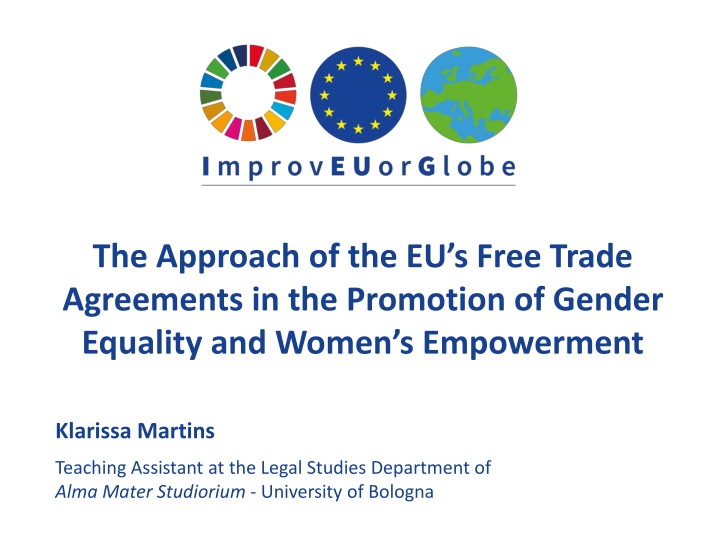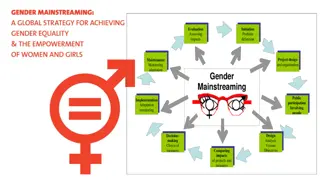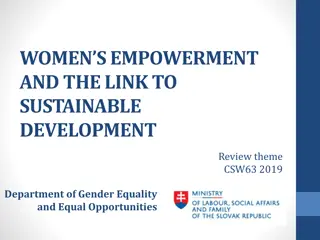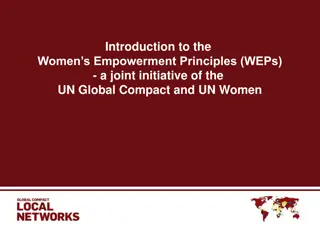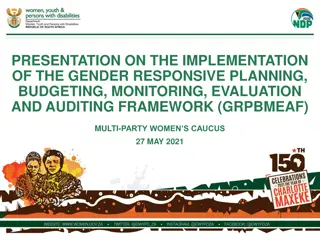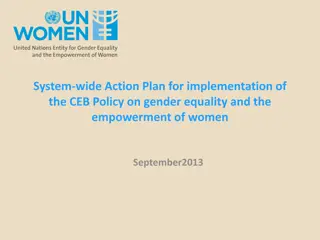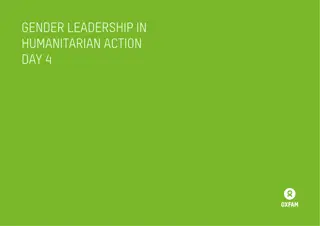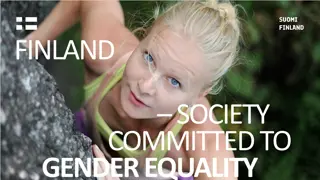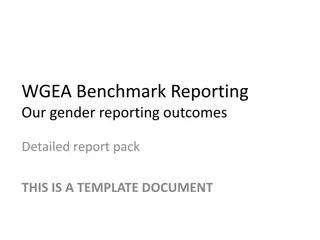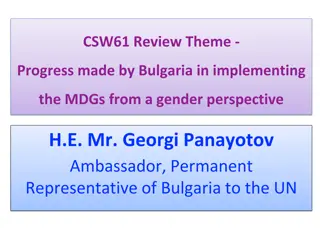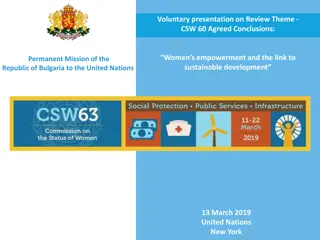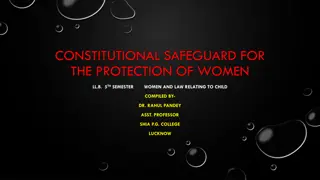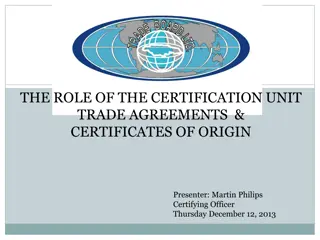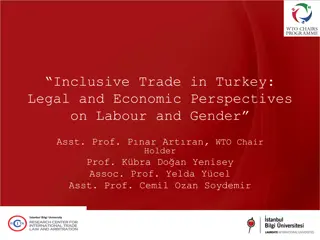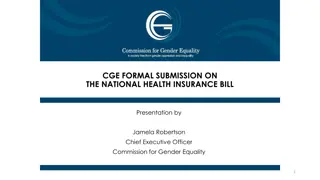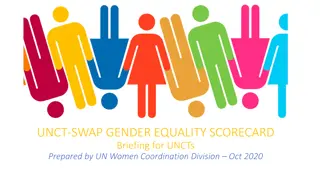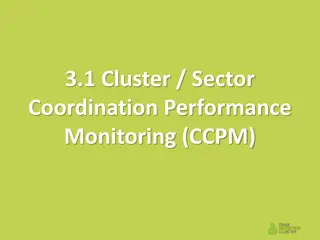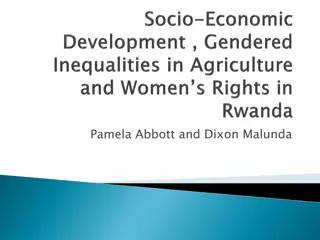The Approach of EU's Free Trade Agreements: Gender Equality & Women's Empowerment
The EU's Free Trade Agreements play a crucial role in promoting gender equality and empowering women. Various international initiatives, such as the 5th Sustainable Development Goal and UN's efforts, highlight the importance of addressing barriers women face in trade. Despite globalization's positive impacts, women encounter obstacles like discriminatory practices, limited access to resources, and cultural biases in international trade endeavors.
Uploaded on Mar 15, 2025 | 2 Views
Download Presentation

Please find below an Image/Link to download the presentation.
The content on the website is provided AS IS for your information and personal use only. It may not be sold, licensed, or shared on other websites without obtaining consent from the author.If you encounter any issues during the download, it is possible that the publisher has removed the file from their server.
You are allowed to download the files provided on this website for personal or commercial use, subject to the condition that they are used lawfully. All files are the property of their respective owners.
The content on the website is provided AS IS for your information and personal use only. It may not be sold, licensed, or shared on other websites without obtaining consent from the author.
E N D
Presentation Transcript
The Approach of the EUs Free Trade Agreements in the Promotion of Gender Equality and Women s Empowerment Klarissa Martins Teaching Assistant at the Legal Studies Department of Alma Mater Studiorium - University of Bologna
5th Sustainable Development Goal 5.a economic resources, as well as access to ownership and control over land and other forms of property, financial services, inheritance and natural resources, in accordance with national laws: Undertake reforms to give women equal rights to 5.b particular information and communications technology, to promote the empowerment of women; Enhance the use of enabling technology, in 5.c policies and enforceable legislation for the promotion of gender equality and the empowerment of all women and girls at all levels. Adopt and strengthen sound
Un Evolution on Gender Equality: - 1975 to 1985: designated the United Nations Decade for Women - 1979: The Convention on the Elimination of all Forms of Discrimination Against Women (CEDAW), which entered into force on Sept. 3, 1981 - 1995: The Beijin Declaration and Platform for Action - 1999: CEDAW s Optional Protocol, which entered into force Dec. 22, 2000 - 2015: the UNGA adopted the 2030 Agenda and established at Sustainable Development Goal n.5 to achieve gender equality and empower all women and girls
Women and Trade Report (2020): Women tend to face disproportionately higher barriers to trade compared to men. In addition to discrimination, women face greater barriers to finance, higher costs of doing business, and more limited access to information and markets. Because women hold a disproportionate share of lower-skill jobs, they can be particularly vulnerable to trade related shocks that directly expose female dominated industries to foreign competition or layoffs resulting from the introduction Women agricultural workers are especially vulnerable to imports because women are more likely to be engaged in less-productive, subsistence farming. of new technologies.
Barriers women face in International Trade Although globalisation have lifted some of the barriers to greater gender equality women still face many barriers to their participation in trade and commerce. These maternity obstacles, employment restrictions, lack of access to capital and productive resources, skills mismatch and inadequate market information and business networks. barriers include regulatory and cultural biases,
Women and Trade Report (2020): Women are more vulnerable in time of crisis Women account for 60 to 80 percent of the workforce in the global value chain (GVC) for apparel, which affected by the pandemic. resulting in factory shutdowns Cambodia, Vietnam, and other countries. has been severely in Bangladesh, A large number of women, could not telework, especially women working in sectors like light manufacturing or retail that require face-to-face interactions. Women faced much higher burden of childcare, because of school closure.
WTO Buenos Aires Declaration (2017) On the occasion of the 11th WTO Ministerial Conference held in Buenos Aires in December 2017 was issued the Joint Declaration on Trade and Women's Economic Empowerment. The Declaration aims ultimately boost economic growth worldwide and provide more and better paid jobs for women., making trade and development policies more gender-responsive by collecting gender data and analysing gender-focused trade, working together in the WTO to remove barriers for women's economic empowerment and increase trade, ensuring that Aid for Trade supports efforts to analyse, design and implement more gender-responsive trade policies. statistics related to their participation in
WTO Buenos Aires Declaration (2017) The promote female entrepreneurship and trade; identify barriers that limit women s participation in trade; promote financial inclusion as well as the access to trade financing and financial assistance for women traders; enhance women entrepreneurs participation in public procurement markets; include women-led businesses, in particular Micro, Small and Medium-sized Enterprises (MSMEs) in value chains; address the impact of trade facilitation in providing equal access and opportunities for women entrepreneurs and inventory of information sources, their complementarity and the identification of data gaps. Buenos Aires Declaration addressed, i.e., the need to:
Outcomes from the Buenos Aires Declaration - Informal Working Group on Trade and Gender (established in 2020); - WTO Gender Research Hub (2021), which serves as a knowledge-gathering platform where the latest research is shared; - WTO Database on gender provisions in RTAs (2021); - Trade&Gender 360 Strategy (2022), which is a capacity-building programme on trade and gender for government officials and women entrepreneurs; - WTO BRIDGE (2022), a training programme aimed at bridging the knowledge gap for women entrepreneurs regarding trade rules; - 1stWTO Congress on Trade and Gender (2022).
Actions within the WTO: Aid and increasingly integrated gender into their Aid for Trade objectives. The 2019 Monitoring and Evaluation economic empowerment is a priority for donors and beneficiaries. Today, 84% of donors strategies and 85% of beneficiaries of national or regional development strategies seek to promote women s economic empowerment. for trade: Bilateral donors and beneficiaries have gradually Exercise reveals that women s TPR: Since 2015, the trade policies of 111 WTO Members have been subject to multilateral review through the TRP. During this period, 70% of the WTO Members under review have integrated women s empowerment into their national or regional trade strategy, mostly to enhance women s participation in the workforce. Some Members have explicitly acknowledged that closing the gender gap is especially important because of its correlation with per capita income, growth, development, and poverty reduction.
Actions within the WTO: Tariff preferences in favour of imports from developing countries are also allowed under the Enabling Clause and the Appellate Body has made clear that such preferences can be conditioned on compliance with development related criteria (and women-related considerations are obviously development related) so long as similarly situated countries are treated similarly in the application of such development conditions. preferences under the Enabling Clause: Tariff The EU General Scheme of Preferences plus (GSP+) have included the CEDAW among the human rights convention, and the ILO Conventions n. 100 and 111 (Equal Remuneration and non- Discrimination on Employment and Occupation, respectively) as a condition to remove import duties.
Actions within the WTO: TBT Agreement: The relevant areas under the TBT Agreement identified as conducive to women empowerment and gender equality are those that encourage transparency of, and access to, information on technical regulations, standards, and conformity assessment procedures and measures designed to give women businesses privileged access to markets through certain technical regulation or international standards requirements. In Standardization (ISO) set out the definition of women entrepreneurship (IWA 34:2021), such as women-owned business and women-led business. 2021 the International Organization for
Definition of women entrepreneurship by ISO: 3.1 women-owned business (3.10) that is more than 50 % owned by one or more women, whose management (3.5) and control (3.7) lie with one or more women, where a woman is a signatory of the business s legal documents and financial accounts, and which is operated independently from businesses that are not owned by women. 3.2 women-led business (3.10) that is at least 25 % owned by one or more women, whose management (3.5) and control (3.7) lie with one or more women, which has at least one third of the board of directors comprised of women, where a board exists, where a woman is a signatory of the business's legal documents and financial accounts, and which is operated independently from businesses that are neither led nor owned by women.
Global Trade and Gender Arrangement (GTGA) In 2020 Canada launched along with Chile and New Zealand an arrangement specifically devoted to trade and gender: the Global Trade and Gender Arrangement (GTGA). The GTGA seeks to promote supportive trade and gender policies that increase women s participation in trade and it is framed on many of the gender-related provisions found in RTAs, such as the principle not to weak or reduce the protection provided in gender equality laws and regulations to promote trade or investment. On October 6, 2021, within the framework of the OECD ministerial meeting, Mexico signed on to join the GTGA, followed by Colombia and Peru in June 2022. In May 2023 Costa Rica and Ecuador joined GTGA.
Gender-Related Provisions in FTAs As many as 78% of the EU s agreements contain at least 1 gender-explicit provision. 38% of trade agreements signed by North American countries have included at least 1 gender-explicit provision. For South American countries, this number is 20%, it is 32% in the case of Africa, and 14% for countries in Asia Pacific.
Gender-Related Provisions in FTAs The current gender provisions in FTAs are very heterogeneous, with notable variations in scope, coverage, format, language, culminating in different levels of gender responsiveness s incidence. Gender provisions refer to terms directly related to gender , women , female , maternity or a similar expression in the provision in an explicit manner. The FTA s can include - entire chapter on gender, but no legal obligations; - just a single provision on gender, but with legal obligation on the parties; - provisions in their main text; others load them in a side agreement, an annex or a protocol. - reaffirmation of the commitments undertaken under other international instruments such as the CEDAW, ILO Conventions and SDGs 2030 Agenda; - cooperation-based provisions where members seek to work together to improve women s access to trade. - creation of committees or institutions to oversee the implementation of gender-related provisions. - Enforcement mechanisms or best endeavour promises.
EU-Vietnam FTA (2019) Article 13.14 Working Together on Trade and Sustainable Development: The Parties, recognising the importance of working together on trade- related aspects of sustainable achieve the objectives of this Chapter, may work together in, inter alia, the following areas: development in order to e) particular productive employment for all, including youth, women and people with disabilities, labour market adjustment, core and other international labour standards, labour statistics, human resources development and lifelong learning, social including for vulnerable and disadvantaged groups, such as migrant workers, women, youth and people with disabilities, and social inclusion, social dialogue and gender equality. trade-related aspects inter-linkage of the ILO Decent trade Work and Agenda, full in the between and protection for all
CETA Recommentation on Trade and Gender (2018) The recommendations from 2018 to increase women s access to, and benefit from, the opportunities CETA created, by: Sharing methods and procedures for collecting gender- focused trade statistics and sex-disaggregated data; the use of indicators, monitoring and evaluation methodologies; and the analysis of gender-focused statistics related to trade. Exchanging experience and best practices related to gender- based analysis of trade policies. Exploring the implications for the design and implementation of trade agreements, including CETA. CETA Joint Committee have made a series of
Gender Provisions in FTAs The Argentina (2019), Chile (negotiations concluded in 2022) are among the handful of "new generation" of FTAs that include a trade and gender chapter. modernised FTAs Canada-Israel (2019) and the modernized EU- between Chile-Canada (2019), Chile- The T&G Chapter set out provisions considering women not only as employees or labourers, leaders, businesswomen and decision makers. The parties encourage their industries and enterprises to incorporate corporate social responsibility explicitly related Specialized committees to implement T&G provisions. but also as entrepreneurs, to gender. Provides for
EU-New Zealand FTA (2022) Specific Trade and Gender article inside the TSD Chapter. SDG n. 5, WTO Buenos ILO Convention n. 111 on the elimination of discrimination in respect of employment and occupation; Right to regulate in relation to the parties respective laws aimed at ensuring gender equality and equal opportunities for women and men. Cooperation on trade-related aspects of gender equality including activities for women workers, businesswomen and entrepreneurs; exchange of information and best practices related to collection of sex-disaggregated data and gender-based analysis of trade policies; Promotion of women's participation, leadership and education, as STEMs and e-commerce; Promotion of financial inclusion, financial literacy and access to trade finance and education- Aires Declaration, CEDAW and
EU-New Zealand FTA (2022) The TSD chapter is subject to the general dispute settlement mechanism, allowing the imposition of trade sanctions in case of non-compliance with a Panel s Report that concludes for the violation of a core multilateral labour standards or for an action or omission that materially defeats the object and purpose of the Paris Agreement. The provision proposals on the Communication issued on 22.06.2022, Introducing for the first time in EU trade agreements trade sanctions for core TSD commitments, in conjunction with the cooperation-based approach, [to] enable the EU to carry out a more assertive enforcement of its TSD chapters . followed the Commission
EU-New Zealand FTA (2022) However, this new approach did not take into account the enforcement international conventions development, such as the Convention on the Elimination of all Forms of Discrimination Against Women (CEDAW), Women s Bill of rights of other on important sustainable considered the
Specific Trade and Gender Chapter The Argentina (2019), Chile (negotiations concluded in 2022) are among the handful of "new generation" of FTAs that include a trade and gender chapter. modernised FTAs Canada-Israel (2019) and the modernized EU- between Chile-Canada (2019), Chile- The T&G Chapter set out provisions considering women not only as employees or labourers, leaders, businesswomen and decision makers. The parties encourage their incorporate corporate social responsibility explicitly related to gender. Provides for Specialized committees to implement T&G provisions. but also as entrepreneurs, industries and enterprises to
EU-Chile Modernised Association Agreement (ECAA) rticle 1 General Provisions: The Parties SDG and reaffirm Cooperation or its successor relating to gender equality and the elimination of gender discrimination ( ) to the OECD Guidelines for Multinational Enterprises, and the requirement under the Guidelines to establish a National Contact Point. ( ) The Parties also acknowledge that women's enhanced participation in the labour market and their economic independence and access to, and ownership of, economic resources contribute to sustainable and inclusive economic growth, prosperity, competitiveness, and the well-being of society. The Parties affirm their commitment and implement effectively their regulations, policies and best practices. recall Goal the 5 of the in the 2030 Agreement Agenda for Labour the obligations on to adopt, equality maintain laws, gender
EU-Chile Modernised Association Agreement (ECAA) Article 1 General Provisions: The Parties SDG and reaffirm Cooperation or its successor relating to gender equality and the elimination of gender discrimination ( ) to the OECD Guidelines for Multinational Enterprises, and the requirement under the Guidelines to establish a National Contact Point. ( ) The Parties also acknowledge that women's enhanced participation in the labour market and their economic independence and access to, and ownership of, economic resources contribute to sustainable and inclusive economic growth, prosperity, competitiveness, and the well-being of society. The Parties affirm their commitment and implement effectively their regulations, policies and best practices. recall Goal the 5 of the in the 2030 Agreement Agenda for Labour the obligations on to adopt, equality maintain laws, gender
EU-Chile Modernised Association Agreement (ECAA) The Parties also acknowledge that women's enhanced participation in the labour market and their economic independence and access to, and ownership of, economic resources contribute to sustainable and inclusive economic growth, prosperity, competitiveness, and the well-being of society. The and regulations, policies and best practices. Parties implement affirm their commitment their to adopt, equality maintain laws, effectively gender
EU-Chile Modernised Association Agreement (ECAA) 5. Areas of cooperation may include ( ) a) promoting women s financial inclusion and education as well as access to financing and financial assistance; b) advancing women s leadership and developing women s networks; c) promoting women s full participation in the economy by encouraging their participation, leadership and education, in particular in fields in which they are underrepresented engineering, mathematics (STEM), business; d) promoting of gender equality within enterprises; e) Women s participation in decision-making positions in the public and private sectors; f) Public and private initiatives aimed at the promotion of female entrepreneurship, including the integration of women in the formal sector of the economy, enhancing the competitiveness of women-led enterprises to allow them to participate and compete in local, regional, and global value chains, and activities to promote the internationalisation of small and medium sized enterprises (SMEs) led by women; g) Policies and programmes to improve women's digital skills and access to online business tools and e-commerce platforms; h) Advancing care policies and programmes as well as work-life balance measures with a gender perspective; ( ) such as as science, as technology, innovation well and
EU-Chile Modernised Association Agreement (ECAA) Cooperation may be undertaken in person or by any technological means available to the Parties, through activities such as: workshops, seminars, conferences, collaborative programmes and projects; exchange of experiences, and sharing of best practices on policies and procedures; and the exchange of experts. 8. Through the TSD Sub-Committee, the Parties shall encourage efforts by the bodies established in this Agreement to integrate gender-related issues, considerations and activities in their work. 9. The Parties shall encourage inclusive participation of women in the implementation of the cooperation activities established under this article, as appropriate.
EU-Chile Modernised Association Agreement (ECAA) According to the agreement, the dispute resolution follows the mixed model present in the EU TSD chapters: Dispute resolution 1. Article 26.20 [Dispute Resolution], Article 26.21 [Consultations] and Article 26.22 [Panel of Expert] of the chapter on Trade and Sustainable Development shall apply to this Chapter mutatis mutandis. Best efforts to implement the Panel s Report without possibility of retaliation in case of non-compliance.
Sustainable Investment Facilitation Agreement (SIFA) EU-Angola (2022) Between EU and Angola (2022)
Fundamental Women's Rights Conventions that should be included in FTAs: Convention on the Elimination of all Forms of Discrimination Against Women (CEDAW), which entered into force on Sept. 3, 1981; CEDAW s Optional Protocol, which entered into force Dec. 22, 2000. Equal Remuneration Convention (No. 100 ) Elimination of Discrimination on Employment and Occupation Convention (No. 111 ) Workers with Family Responsibilities Convention (No. 156 ) Maternity Protection Convention (No. 183 )
Enforceability of Gender Provisions in EU FTAs Although related provisions in FTAs, many of them do not set out legal obligations through prescriptive commands to be fulfilled by the contracting parties and do not provide for a dispute settlement mechanism able to enforce compliance. In summary there are three different approaches: a cooperative one, that encourages the parties to solve any dispute arising from the gender provisions through diplomatic means; a sanction-based one under which the matter is solved through binding adjudication of a panel of experts or arbitral tribunal; and a mixed procedure that firstly attempt to amicably solve the consultations, and whether consultations fail, the question is submitted to a panel of experts which issues recommendations to be followed by the parties through their best efforts but without being backed by any sanction in case of non-compliance. there is an increasingly inclusion of explicit gender- matter through State-to State
Current Challenges and Perspectives: Standardization of gender-related provisions in FTAs and IIAs: Commitment with the fundamental Conventions on Women's Rights; Collection of sex-disaggregated address trade barriers faced by women; Participation of civil society and the representation of women in international trade policy bodies, as the Trade and Gender Committee; Consider high tariffs faced by women s consumers; Cooperate on enhancing women s access to financing; Address specific barriers faced especially SMEs; Define a model of DSM to solve related provisions to prevent discriminatory treatment among trading partners; Foster enhanced cooperation to empowerment, boosting trade liberalization for a more inclusive and sustainable international trade that leaves no women behind. data and gender statistics to better by for women s entrepreneurs, conflicts arising from gender- effectively promote women s
Thank you very much! klarissa.martins2@unibo.it
